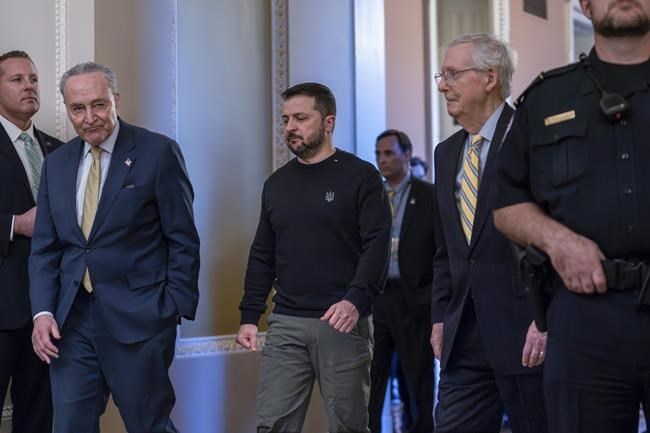WASHINGTON — Ukraine's battle-weary president was back in the U.S. capital Tuesday for the second time in three months, hoping to help bridge all-too-familiar political fault lines on Capitol Hill that pose an existential threat to his country.
Volodymyr Zelenskyy, clad in a black sweatshirt with a Ukrainian military insignia, was flanked by the Republican and Democratic leaders as he arrived for a last-ditch effort to pry loose US$61 billion in military and humanitarian aid.
But there was little evidence Zelenskyy's latest goodwill tour has done anything to sway hardline Republican lawmakers who want strings attached to the money — not to mention meaningful action on immigration reform.
"I have asked the White House, since the day that I was handed the gavel as Speaker, for clarity," said Rep. Mike Johnson (R-La.), the man who in October took over from Kevin McCarthy as second in line to the U.S. presidency.
"We need a clear articulation of the strategy to allow Ukraine to win. And thus far, their responses have been insufficient."
Sitting alongside Zelenskyy in the Oval Office, U.S. President Joe Biden urged Congress to act, calling a failure to deliver aid before the holidays "the greatest Christmas gift they could possibly give" to Russian President Vladimir Putin.
"We've seen what happens when dictators don't pay the price for the damage and the death and destruction they cause — they keep going when no price is paid," Biden said.
"The threat to America to Europe and the world only keeps rising if we don't act."
The real barrier, however, is immigration. House Republicans are refusing to entertain a supplemental aid package for Ukraine without a meaningful effort to stanch the flow of migrants into the U.S. at the southern border.
"There is strong, bipartisan support for assisting Ukraine," said Sen. John Thune (R-N.D.), the Senate minority whip. But Democrats and the White House have so far refused to address the border issue, he said.
"If we could get ... a little bit of work on behalf of the Democrats to actually get some border security provisions included in the package, we could get to something that we could actually vote on," Thune said.
"But as of right now, the president has not been willing to engage, regrettably."
When the two leaders emerged from their White House meeting, they did their best to present a strong and united front, with Biden vowing to Republicans in Congress that he would negotiate in good faith.
"Compromise is how democracy works," Biden said. "Holding Ukraine funding hostage and attempting to force through an extreme Republican partisan agenda on the border is not how it works. We need real solutions."
Zelenskyy, as he does, steered clear of wading into partisan disputes on foreign soil beyond saying he got "more than positive" signals during his meetings with members of Congress.
"We are fighting for our country and freedom, and also in Europe, for our freedom, and yours," he said in English.
"It's very important that by the end of this year, we can send (a) very strong signal of our unity to the aggressor — and the unity of Ukraine, America, Europe, the entire free world."
Legislation has already been passed by the House that would impose rigid new limits on asylum claims and significantly fortify security measures at the U.S.-Mexico border, but that bill is languishing in the Senate, Johnson said.
"These are our conditions, because these are the conditions of the American people," he said. "The issue is with the White House and the Senate, and I implore them to do their job because the time is urgent. And we do want to do the right thing here."
The stakes are indeed high, said Jack Cunningham, an international relations professor and program director at the Bill Graham Centre for Contemporary International History at the University of Toronto.
The war in Ukraine, which is now a grinding war of attrition against a deeply entrenched Russian enemy, is only going to get more difficult as the winter season worsens, Cunningham said.
That could lead to perceptions of a stalemate, a state of affairs that would play directly into Putin's hands, he added.
"I think he would like nothing better than to see the Ukrainians denuded of equipment, stuck in a stalemate through the winter, and — as a result — popular support in the United States, as well as congressional support, fading."
Ukraine is indeed running desperately low on vital military equipment, including supplies, ammunition, anti-aircraft missiles and other high-tech tools that only the U.S. military is in a position to provide, Cunningham said.
A stalemate would also fortify Republican opposition to supporting Ukraine's war effort by making the case that the aid hasn't worked so far, he added.
But the biggest takeaway is the fact that political support in the U.S. for backstopping overseas conflicts appears to be rapidly draining away at a time of widening economic and geopolitical instability.
The possibility of Donald Trump reclaiming the White House in 2024 is likely to amplify those sentiments, Cunningham said.
"The isolationist forces within the United States are strong, and if Trump returns next year, they will be even stronger," he said.
"We've seen this in the past: in the interwar period, the United States turned its back on the rest of the world and tried to wash its hands of international instability. That made the next world war all the more likely."
The former president seized on Zelenskyy's meeting with Biden to try and tamp down the idea that Trump-loyal Republicans in Congress are whistling past a global crisis.
"Only President Trump can prevent World War 3," his campaign declared in an email.
This report by The Canadian Press was first published Dec. 12, 2023.
James McCarten, The Canadian Press



